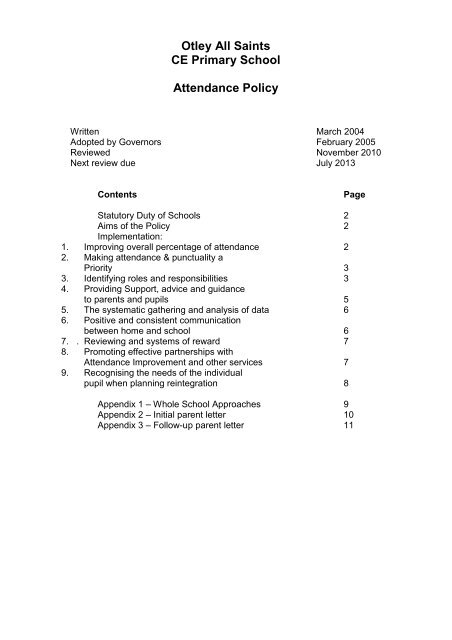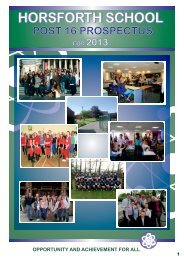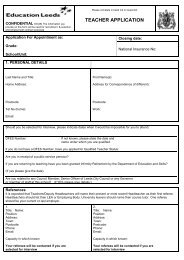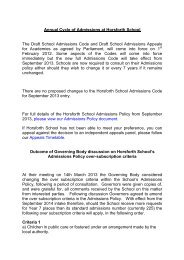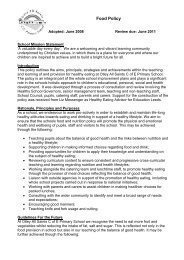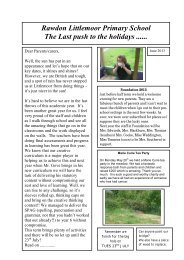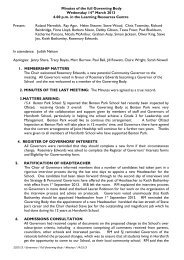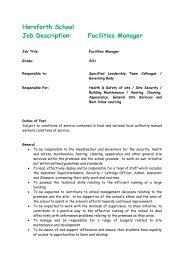Otley All Saints CE Primary School Attendance Policy - Drighlington ...
Otley All Saints CE Primary School Attendance Policy - Drighlington ...
Otley All Saints CE Primary School Attendance Policy - Drighlington ...
Create successful ePaper yourself
Turn your PDF publications into a flip-book with our unique Google optimized e-Paper software.
<strong>Otley</strong> <strong>All</strong> <strong>Saints</strong><br />
<strong>CE</strong> <strong>Primary</strong> <strong>School</strong><br />
<strong>Attendance</strong> <strong>Policy</strong><br />
Written March 2004<br />
Adopted by Governors February 2005<br />
Reviewed November 2010<br />
Next review due July 2013<br />
Contents<br />
Page<br />
Statutory Duty of <strong>School</strong>s 2<br />
Aims of the <strong>Policy</strong> 2<br />
Implementation:<br />
1. Improving overall percentage of attendance 2<br />
2. Making attendance & punctuality a<br />
Priority 3<br />
3. Identifying roles and responsibilities 3<br />
4. Providing Support, advice and guidance<br />
to parents and pupils 5<br />
5. The systematic gathering and analysis of data 6<br />
6. Positive and consistent communication<br />
between home and school 6<br />
7. . Reviewing and systems of reward 7<br />
8. Promoting effective partnerships with<br />
<strong>Attendance</strong> Improvement and other services 7<br />
9. Recognising the needs of the individual<br />
pupil when planning reintegration 8<br />
Appendix 1 – Whole <strong>School</strong> Approaches 9<br />
Appendix 2 – Initial parent letter 10<br />
Appendix 3 – Follow-up parent letter 11
At <strong>Otley</strong> <strong>All</strong> <strong>Saints</strong> <strong>CE</strong> <strong>Primary</strong> <strong>School</strong> we are committed to:<br />
<br />
<br />
<br />
<br />
<br />
Ensuring that all our pupils receive a full-time education which maximises opportunities<br />
for each to realise his/her full potential.<br />
Providing a welcoming, caring environment, whereby each member of the school<br />
community feels wanted and secure.<br />
Working with pupils and their families to ensure each pupil attends school regularly and<br />
punctually.<br />
Utilising an effective system of incentives and rewards which acknowledges<br />
improvements pupils make to their attendance and timekeeping and challenges the<br />
behaviour of those pupils and parents who give low priority to attendance and<br />
punctuality.<br />
Establishing an effective and efficient system of communication with pupils, parents<br />
and appropriate agencies to provide mutual information, advice and support.<br />
Statutory Duty of <strong>School</strong>s<br />
The Education Act 1996 requires parents or guardians to ensure their children receive<br />
efficient, full-time education, either by regular attendance at school or otherwise. <strong>School</strong>s<br />
are responsible for recording pupil attendance twice a day; once at the start of the morning<br />
session and once during the afternoon session. An entry must be made in the attendance<br />
register for all pupils of compulsory school age who are on the school’s admission roll.<br />
Aims of the <strong>Policy</strong><br />
1. To ensure absent children are not at risk<br />
2. To improve the overall percentage of pupils attending school.<br />
3. To make attendance and punctuality a priority for all those associated with the<br />
school including pupils, parents, teachers and governors.<br />
4. To define roles and responsibilities and promote consistency in carrying out<br />
designated tasks.<br />
5. To provide support, advice and guidance to parents and pupils.<br />
6. To systematically gather and analyse attendance related data.<br />
7. To further develop positive and consistent communication between home and<br />
school.<br />
8. To continue to review and improve systems of rewards.<br />
9. To promote effective partnerships with the <strong>Attendance</strong> Improvement Service and<br />
other services and agencies.<br />
10. To recognise the needs of the individual pupil when planning reintegration following<br />
significant periods of absence.<br />
Implementation<br />
1. Improving the overall percentage attendance of pupils attending school<br />
<br />
<br />
We will apply the whole school attendance policy consistently<br />
The school will review this policy regularly and assess its implementation and<br />
effectiveness.<br />
The policy will be known to all, promoted and implemented throughout the<br />
school.<br />
We have established and will maintain a high profile for attendance and<br />
punctuality<br />
2
See Whole <strong>School</strong> Approaches (Appendix 1)<br />
<br />
<br />
We relate attendance issues directly to the school’s vision, aims and<br />
curriculum<br />
We monitor progress in attendance measurable outcomes<br />
The school will endeavour to meet the yearly targets agreed by the Governing<br />
Body.<br />
2. Making attendance and punctuality a priority for all those associated with the<br />
school including pupils, parents, teachers and governors<br />
<br />
<br />
<br />
<br />
<br />
<br />
<br />
<br />
We use our staff handbook and prospectus to promote high attendance<br />
and punctuality<br />
Both documents contain statements about attendance.<br />
Our annual pupil progress report includes attendance figures<br />
The report to parents includes the child’s authorised and unauthorised<br />
attendance for the year.<br />
Reports to Governors include attendance<br />
The Headteacher’s report to the Governing Body includes a statement on<br />
attendance.<br />
<strong>Attendance</strong> is discussed at the induction meeting for new arrivals and<br />
their parents<br />
The importance of attendance is addressed at these meetings<br />
An attendance and punctuality statement is included in Home <strong>School</strong><br />
agreements<br />
Every child receives a Home/<strong>School</strong> Agreement which is signed by the school,<br />
parent and child. The agreement includes a statement on attendance.<br />
Discussions about attendance issues are held in meetings with staff and<br />
<strong>Attendance</strong> Improvement<br />
Discussions take place with <strong>Attendance</strong> Improvement at timetabled meetings<br />
and with staff on as regular a basis as is deemed necessary<br />
We provide an award system<br />
To raise the profile of attendance in the school termly attendance certificates are<br />
presented. At the end of the school year 100% attendance certificates are<br />
presented<br />
We promote attendance and punctuality via class mission statements.<br />
3. Identifying roles and responsibilities and promoting consistency in carrying<br />
out designated tasks<br />
<br />
Roles and responsibilities within the school staffing structure<br />
Registers are a legal document and are kept according to the approved regulations.<br />
3
Every day the class teacher marking the register will consider whether any<br />
absence/lateness is causing concern. The Headteacher will be informed of any<br />
concerns and a decision made as to how the concern will be best acted upon.<br />
<br />
We endeavour to maintain unambiguous procedures for statutory<br />
registration<br />
The school will ensure that pupils are registered accurately and efficiently. The<br />
morning registration is 9.00 am, afternoon registration to be completed within 15<br />
minutes of start of session. Registers are closed at the following times: morning<br />
9.15 am and afternoon 1.30 pm.<br />
The register is marked by the class teacher, marking the pupil present or absent.<br />
The pupils who have arrived late, at both the morning and afternoon sessions are<br />
given a late present mark up to 9.15 am in the morning and 1.30 pm in the<br />
afternoon. After these times see Lates below.<br />
Lates – Children who arrive late will report to reception where they will be<br />
registered as late. Before the designated time this is a ‘Late Present’ – which<br />
appears as an L on the register. After the time it is a ‘Late Absent’ – which appears<br />
as an @ on the register.<br />
Absence notes/Telephone messages from parents will be received by the class<br />
teacher and registers filled in appropriately. The note/messages will be stored in<br />
the register.<br />
<br />
Responding quickly to lateness (pupils and parents)<br />
A letter is sent to parents/carers where pupils have three or more late marks within<br />
a week and there have been a number of late arrivals recorded in the previous two<br />
weeks, to seek their support in ensuring their child’s prompt arrival at school.<br />
The class teacher will monitor pupils who show a pattern of being late. The<br />
Headteacher will be informed where lateness persists and a card will be set up and<br />
occasions accurately recorded. Parents will be informed of school’s concern and<br />
asked to meet with the Head to discuss the issue and seek an improvement.<br />
<br />
Responding quickly to unexplained absences<br />
An unexplained absence will be followed up with a phone call by the admin officers<br />
requesting a valid reason for Absence. If the parent is not available a message will<br />
be left for them to contact the school. The admin officer will make a further phone<br />
call on the next day if necessary. If on the 3 rd day there has been no response a<br />
letter will be sent (Appendix 3). If there is still no response within 3 days another<br />
letter will follow (Appendix 4)<br />
Where there are repeated unexplained absences a record card will be set up and all<br />
absences recorded. A letter requesting a meeting with the Headteacher will be<br />
instigated – this is Stage 1 of the <strong>Attendance</strong> Improvement 5 stage process.<br />
Should a pattern of unexplained absences emerge then a referral will be made to<br />
the <strong>Attendance</strong> Improvement Service. This is Stage 2 of the <strong>Attendance</strong><br />
Improvement Service 5 stage process.<br />
4
Stages 3, 4 and 5 will be followed as and when necessary (reference to ‘<strong>Attendance</strong><br />
Toolkit)<br />
<br />
We review attendance<br />
Annual attendance figures are monitored by the Headteacher. The figures are<br />
compared, analysed and evaluated by the Headteacher and SMT. Figures are<br />
measured against targets agreed by governors and also against previous targets.<br />
Percentage figures and comparisons are reported to governors. The data will be<br />
analysed in relation to targets set and specific individuals or groups will be identified<br />
for whom special attention is required.<br />
<br />
We are familiar with the <strong>Attendance</strong> Improvement’s referral and recording<br />
system<br />
There is an annual meeting of the Headteacher with the <strong>Attendance</strong> Improvement<br />
Officer to establish the Service Agreement and review systems and procedures.<br />
4. Providing support, advice and guidance to parents and pupils<br />
<br />
We highlight attendance issues with pupils<br />
We use a range of appropriate opportunities as and when necessary to provide<br />
support, advice and guidance to pupils with attendance issues. This may be:<br />
- In PSH<strong>CE</strong><br />
- Circle Time<br />
- Assemblies<br />
- <strong>School</strong> Council<br />
- Staff talking to pupils<br />
- Staff talking to parents<br />
- Referring to each class mission statement (Investors In Pupils)<br />
<br />
<br />
<br />
<br />
We draw on support from other agencies<br />
The <strong>Attendance</strong> Improvement Officer may be called on to support families. We<br />
will call on other agencies as and when appropriate (social Services, Health,<br />
Police etc)<br />
We sustain and endeavour to develop further, good communication with<br />
parents<br />
The school prides itself on the good and positive relationships it has with<br />
parents. Effective communication systems are in place and parents are made to<br />
feel welcome and are able to gain easy access to the Headteacher, Class<br />
Teacher, Classroom Assistant and other staff to talk over attendance or/and<br />
lateness concerns. It is the policy of the school to report success and<br />
achievement as well as difficulties.<br />
We provide accurate and up-to-date attendance information for parents<br />
Leaflets on <strong>Attendance</strong> from the DfE are made available for parents.<br />
We involve parents from earliest stage<br />
Good attendance is promoted at the meeting for Reception September entrants<br />
and parents of nursery children are encouraged to inform school of an absence.<br />
5
5. The systematic gathering and analysis of attendance related data<br />
<br />
<br />
<br />
Manual registration<br />
This is used to generate accurate figures for recording purposes and for<br />
reporting to parents and governors.<br />
Standardise recording of authorised/unauthorised absence, educational<br />
activity and presence<br />
Guidelines are inside every register<br />
Parents inform school if a pupil is going out of school for any reason after<br />
registration and the child is collected by an adult<br />
Identifying developing patterns of irregular attendance and lateness<br />
The Class teacher and Headteacher monitor this through the collection of<br />
information on individual absence or lateness cards.<br />
6. Positive and consistent communication between home and school<br />
<br />
<br />
Making First day absence contact<br />
The Admin Officer is responsible for trying to contact parents on the first day of<br />
absence. (see section 3)<br />
Promoting expectation of absence letters/phone calls from parents<br />
Parents are regularly reminded of the appropriate procedures.<br />
Parental Holidays<br />
Parents are invited to write formally to the Headteacher to request leave of<br />
absence for parental holidays during term time using the agreed request form.<br />
The Governors have agreed to ten school days per year in line with Education<br />
Leeds policy at the headteacher’s discretion. The Education Leeds Extended<br />
Leave policy is implemented in exceptional circumstances. The practice of<br />
parental holidays is actively discouraged.<br />
Condoned absence<br />
It is illegal for parents to absent their children from school. Unauthorised<br />
absences are carefully monitored and every effort is made to liase with and work<br />
with parents who condone unnecessary absences in order to improve the child’s<br />
overall attendance.<br />
<br />
<br />
Providing information in a user friendly way<br />
Translations can be provided if necessary and leaflets on attendance from the<br />
DfE are available in a range of languages from the school.<br />
Encouraging all parents into school<br />
Parents are welcomed into school at the beginning and the end of the school<br />
day for informal discussion with class teacher and for two more formal parent<br />
consultation meetings in both Autumn and Spring<br />
7. Reviewing and systems of rewards<br />
<br />
Actively promoting attendance and associated rewards<br />
6
The school has a coherent and co-ordinated approach to recognising and<br />
rewarding good behaviour and attendance for all pupils and this is reflected in<br />
the value that is attached to praise and reward.<br />
End of term and end of year<br />
Certificates are awarded termly to pupils with full attendance for the term.<br />
There is also a certificate awarded in July for full attendance over the year.<br />
<br />
Involving pupils in system evaluation<br />
Issues will be discussed at <strong>School</strong> Council meetings<br />
8. Promoting effective partnerships with the <strong>Attendance</strong> Improvement Service<br />
and other services and agencies<br />
<br />
<br />
<br />
<br />
<br />
We have a designated key member of staff to liase with <strong>Attendance</strong><br />
Improvement and other agencies<br />
The Headteacher is the designated member of staff<br />
We gather and record relevant information to assist completion of<br />
<strong>Attendance</strong> Improvement Service reports.<br />
Both the school office staff and Headteacher make information available to<br />
<strong>Attendance</strong> Improvement Officer.<br />
The Leadership team review attendance<br />
<strong>Attendance</strong> issues appear on the LT agenda termly or as and when necessary.<br />
Reviews with <strong>Attendance</strong> Improvement are ongoing and called as and when<br />
necessary.<br />
Multi-agency liaison meetings are arranged as appropriate<br />
The Headteacher has clear lines of communication with the <strong>Attendance</strong><br />
Improvement Officer and liases on as regular a basis as possible. Other<br />
agencies that may be involved include Health and Social Care and the Early<br />
Years Centre where parents have access to pastoral support. Where necessary<br />
the Behaviour Learning and Inclusion Support Service will be involved.<br />
Encouraging active involvement of other services and agencies in the life<br />
of the school<br />
The school believes that the transition to secondary school can be a difficult<br />
period for some children. Currently the school is an active partner in a joint<br />
transition initiative with Prince Henry’s Grammar <strong>School</strong> to which most of our<br />
children transfer.<br />
9. Recognising the needs of the individual pupil when planning reintegration<br />
following significant periods of absence<br />
- We will be sensitive to the individual needs and circumstances of returning<br />
pupils<br />
Teachers will ensure that children do not feel isolated after an absence.<br />
Work may be of an individual nature or friendships encouraged.<br />
- Involve/inform all staff in reintegration process<br />
7
- Provide opportunities for counselling and feedback<br />
- Consider peer support and mentoring<br />
- Involve parents as far as possible<br />
- Agree timescale for review of reintegration plan<br />
- Include <strong>Attendance</strong> Improvement, parents and pupils in reintegration plan<br />
8
Appendix 1<br />
WHOLE SCHOOL APPROACHES<br />
Bullying<br />
The school has effective behaviour, anti-bullying and anti-racist policies. Perpetrators are<br />
identified and their behaviour carefully monitored. The whole school adopts a positive<br />
approach to discipline and this is regularly reviewed by senior management.<br />
SEN Monitoring<br />
There is an effective system of identification in line with the Code of Practice. The<br />
SENCO plays an active role and gives support to children and families who may be nonattenders<br />
due to learning or behavioural difficulties.<br />
Strategies used in class to promote good attendance<br />
Teachers encourage children to improve their work to enable them to do better by<br />
<br />
<br />
<br />
<br />
<br />
<br />
<br />
<br />
Making clear the shape of the lesson<br />
Indicating what outcomes are intended<br />
Setting realistic targets to be achieved in given times<br />
Stating clearly how work will be assessed<br />
Establishing marking procedures and using some pupil’s self assessment<br />
Recognising effects of regular failure and finding compensation for it<br />
Helping some pupils to cope rather than improve<br />
Avoiding repetitious unchallenging tasks<br />
Teachers employ a range of teaching and learning styles to enable all pupils to feel<br />
secure, included and valued and differentiate work to meet the needs of pupils.<br />
<strong>All</strong> staff welcome pupils back into school after absence and assist in their smooth<br />
reintegration back into class.<br />
9
Appendix 2<br />
Dear ( )<br />
On …………………………… your child ……………………………… as absent from school.<br />
Please will you phone or write to explain this absence in order that we can record it.<br />
It is our responsibility to ascertain the reasons behind all absence and your help in this<br />
matter would be greatly appreciated<br />
Yours sincerely
Appendix 3<br />
Dear ( )<br />
Recently we (wrote to you/phoned and left a message)regarding the absence of (child’s<br />
name) on (date)<br />
As we indicated on that occasion it is the school’s responsibility to account for all absences<br />
and your help in this matter is requested.<br />
Without your input (name’s) absence will have to be recorded as unauthorised and this<br />
will go onto (his/her) record of attendance.<br />
Please take a few moments to inform us as to the reason by either phoning or writing a<br />
note. This would be most appreciated.<br />
Yours sincerely<br />
11


